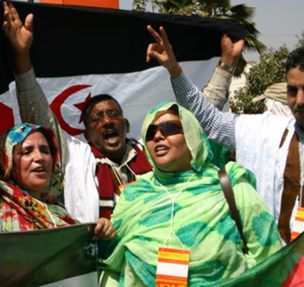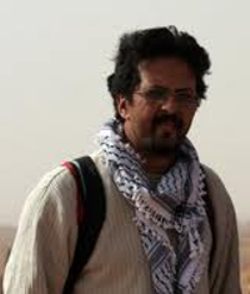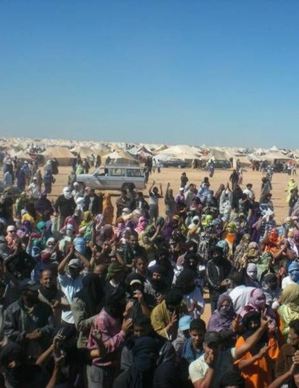|
Western Sahara | Morocco | Algeria Politics Saharawis at unease over Algeria, Morocco unrest
The wave of revolt is getting closer for the Saharawis. For this weekend, the start of mass protests in Algeria has been announced - Algeria being the main ally of Saharawis fighting for their independence and the host for around 150,000 Saharawi refugees. For next weekend, marches are announced in Morocco - their occupying power.
Mr Malainin agrees to parts of the argument. "Saharawis in the camps or in the occupied territories, are, and must be, concerned about anything that happens in Algeria because Algeria is our main ally and supporter, yet I do not think that there will be a 'revolt' in Algeria similar to those in the neighbouring countries," he argues, adding that political freedoms and the human rights situation in Algeria is better. "As for the position of Algeria regarding Western Sahara conflict, it has never changed since the 1960s, because it is not a position linked to individuals, or presidents or governments or interests," he adds, referring to the continuous backing from Algiers throughout changing regimes. "This said, we hope that the Algerian government succeeds in resolving all the social, economic or political problems it may face now or in the future, because a strong, prosperous Algeria is of course a strong and important friend and ally and Saharawis have everything to gain from that," Mr Malainin carefully adds. Another development that strongly could influence the Saharawi fight for independence is the announced mass protests in Morocco, set to start next weekend. In several forums, Saharawis loudly discuss what this could mean for their cause and whether a Moroccan revolt could have any chance of succeeding. Officialist Saharawi media are eager to spread as much information about the planned protests as possible. While Salek Jatri Andala, blogging on 'Futuro Saharaui', argues that the "divine" position of the King in Morocco leaves no hope for the protesters and that Saharawis should "not fall into the error of hoping for the [Moroccan] population to support us," others argue a revolt in Morocco could open a Pandora's Box. Mr Malainin again carefully points out that "the Saharawis are not the ones who call for the revolt in Morocco, there are a lot of Moroccan voices that start calling for change in their countries, and their calls are very legitimate." He however reveals that Saharawi media are trying to help the Moroccans read real information about their own country." "But, I personally think that the Moroccan people are not yet ready to pay the price the Egyptian paid to get power back. Morocco will wait for years before any similar change, I think," he says. Ref
In Western Sahara, which has seen some of the most forceful popular revolts against the Moroccan occupiers a few months ago, the situation is almost suspiciously calm nowadays. "Could there be a feeling among Saharawis under occupation that it is better to keep calm now, so as to give Moroccans a chance to focus on their own rebellion?" afrol News asks Mr Malainin. He rejects the question. There had "always been struggling against the occupation," he insists, but this had "seldom attracted international media's" attention. "There are these days demonstrations in Tan Tan, Gulmim, Fask - and it will never stop." But as the protests against authoritarian Arab regimes are spreading around the region, there is of course renewed questioning of how democratic the exiled government of Western Sahara - formed out of the freedom fighting movement POLISARIO - really is. In the name of the need for national unity until Western Sahara is liberated, POLISARIO is the one-and-only political movement allowed. The question is increasingly raised at international levels. Chargé d'Affaires Robert P. Jackson of the US Embassy in Morocco in August 2009 held that Morocco was experiencing "real political competition, while perhaps not democracy," which seemed "far more open than the Cuba-like POLISARIO system. Through the journal 'Futuro Saharaui', unemployed Saharawi youths have also called for more pluralism. Through debate forums, some Saharawis have said that, after the fall of the dictators in Tunisia and Egypt, one should organise a revolution in the refugee camps against "the regime of [POLISARIO leader Mohamed] Abdelaziz and his band." Other insist "we are not in the same situation as the Tunisians .. We don't have political opponents forced into exile." Mr Malainin, who is friendly towards the exiled government, insists "there are always critics to POLISARIO in the camps and they are always tolerated by the Saharawi leadership. I do not think that the problem in the camps is more democratisation or not, the problem is that people are tired of waiting for the UN to respect its promises and a dangerous frustration from this international silence in front of the Moroccan crimes." "Saharawis will always fight for democracy and for their rights and they will face anyone who dare violate these rights be it Morocco or any foreign power or be it any Saharawi leader or government," Mr Malainin concludes. By Rainer Chr. Hennig © afrol News - Create an e-mail alert for Western Sahara news - Create an e-mail alert for Morocco news - Create an e-mail alert for Algeria news - Create an e-mail alert for Politics news
On the Afrol News front page now
|
front page
| news
| countries
| archive
| currencies
| news alerts login
| about afrol News
| contact
| advertise
| español
©
afrol News.
Reproducing or buying afrol News' articles.
You can contact us at mail@afrol.com










